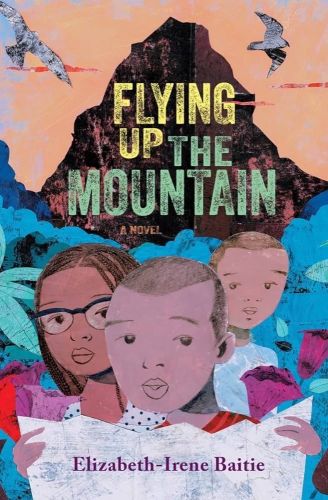Flying Up the Mountain
 Flying Up the Mountain
Flying Up the Mountain
Fiction / Ages: 8-12 / Elementary / Middle / Ghana
Norton Young Readers
October 3, 2023

"When Ato and his friends visit Nnoma, the West African bird sanctuary In Ghana that Ato’s father helped build before he died, the trio uncovers a sinister plot to exploit the sanctuary and must work together to protect it." Publisher
If mystery, competition and drama between nemesis and protagonist is what you are into, then Elizabeth-Irene Baitie’s Flying Up the Mountain is the perfect story for you. In this sequel to Crossing the Stream (2022), we reconnect with Ato, the young Ghanaian protagonist. Ato enters a competition on Nnoma, the sacred bird village created by his late father. He hopes to become an Asafo, the title given to traditional warrior groups in Akan culture. More importantly, Ato is determined to find a plan his father left hidden in Nnoma. According to his grandmother, Nana, this plan details his father’s efforts to protect this natural habitat from encroaches and greedy miners. The competition for the Asafo title is tough. In groups of four, teenagers must compete in eight different games dubbed missions where each task teaches preservation of nature in some form. For example, mission one requires the teams to capture the beauty of animals through photography. Subsequent missions include rafting through dark caves and hiking up high mountains.
In the quest to find his father’s plan, Ato discovers that something is amiss. Eyra, the energetic and friendly proprietress of Nnoma, begins missing social functions that require her presence and acts strangely towards the kids. Other adult counselors exhibit suspicious behavior and give questionable responses to the children. These incidents set the stage for the adventurous ride that Ato and his teammates, Leslie, Hasfat and Dzifa are in for. This is a story about heritage, family, friendship and fierce competition. The themes revolve around strength in unity, being truthful to oneself, believing in the unique capabilities of teammates and knowing when to ask for help. It also teaches the importance of standing up for what is right and questioning authority figures especially when they are wrong.
Through easy-to-follow dialogue and delicious descriptive diction, Baite’s ecocritical novel hammers home the need to return to nature not just for the climate but as a healing remedy for one’s individual health. Characters only eat fresh plant-based diets. The children are excited to enjoy salads made from a wide variety of fruits and vegetables as well as soups and porridges made from grains and berries such as sorghum, millet, rice, atemoya, soursop and many others. Readers, especially those beyond Ghana, will discover a wealth of new foods to explore. The novel champions the significance of healthy eating, especially for children without getting preachy about veganism or vegetarianism. Yet it is obvious from the themes, that it encourages treating animals with respect as living organisms that are also capable of reasoning like humans hence, the need to avoid slaughtering them for food.
One of the strong points in the novel is how Baitie builds suspense. The reader is hooked from the beginning with the mention of Ato’s father’s plan which we do not get any details about until the end. All we know is that there is a plan hidden in Nnoma that must be found in order to ensure that the sanctuary is perpetually preserved for generations to come. This aside, the introduction of sinister undertones at Nnoma adds an extra layer of complexity to the plot. As the teenagers embark on their quest to unearth the hidden plan, the ominous atmosphere and the lurking danger intensify the sense of foreboding. Baitie skillfully crafts a thrilling narrative that keeps readers on edge, constantly fearing for the safety of the characters who dare to explore the mysteries surrounding Nnoma.
In the end, the transformation of what it means to be Asafo, coupled with the altered paths the characters must traverse to attain it, adds a satisfying layer of complexity to the resolution. Baitie’s adept handling of suspense contributes significantly to the novel’s success. The carefully orchestrated layers of mystery, combined with the ever-present danger and unexpected twists, create a narrative tapestry that captivates the reader’s imagination.
As a sequel to Crossing the Stream, Flying Up the Mountain not only excels in its thrilling narrative and suspenseful storytelling, it also demonstrates Elizabeth-Irene Baitie’s adeptness at creating a compelling franchise. With Ato as the central character, the novel promises not just a single captivating story but the potential for an ongoing series. Baitie’s ability to maintain suspense from the beginning to the end, unveiling secrets and mysteries at a carefully orchestrated pace, showcases her mastery of the genre. Readers are left eagerly anticipating further adventures with Ato, as the novel not only entertains but lays the groundwork for a broader exploration of environmentalism, friendship, and the strength found in unity. With its rich thematic elements and engaging plot, Flying Up the Mountain stands as a promising addition to the world of young adult literature, leaving readers eager for the next chapter in Ato’s journey.
Elizabeth Abena Osei, MA
University of Maryland, College Park
Published in Africa Access Review (March 15, 2024)
Copyright 2024 Africa Access
